Rational Scientific Theories from Theism
Introduction •
Approaches •
Beginning • Source Books •
Courses • Basic
Principles • Consequences •
Resources • Site
|
Rational Scientific Theories from Theism
Introduction •
Approaches •
Beginning • Source Books •
Courses • Basic
Principles • Consequences •
Resources • Site |
Brief Overview of Theism:Creation as a Representation of the DivineWe hear, for instance, from religion that 'Love makes the world go round', 'God is Love', 'God is personal' or 'God transcends personhood', and 'the One True Religion is of Universal Love'. We hear, for instance, from scientists that science is the attempt to determine the natural laws that govern our world, and science makes no reference to love in determining what 'makes the world go round'. We hear, for instance, from advocates of the New Age, that we are 'heading towards a non-mechanical reality; the universe begins to look more like a great thought than a great machine' [James Jeans], 'we have dreamed the world'. How do we draw all these strands together? (insofar as they are true, of course!). We are fortunate that Swedenborg has given us the basic ideas necessary for us to do just that. He has tried to convey to us how
What are these basic ideas?I state them now for reference, but we will come back to them in many ways:
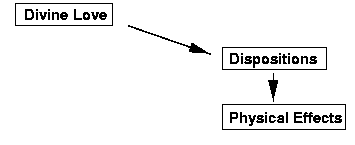 In fact, dispositions do not spontaneously produce effects on their own, but only in suitable circumstances. Examples of dispositions in physics:
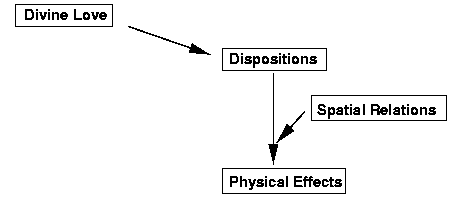 Here I have tried to represent the fact that 'dispositions operate by means of spatial relations to produce effects'. This may seem a rather obvious thing to say, but now we come to important point (2.) of Swedenborg's: that which life and dispositions we have, are Divine Love limited in accordance with our actual history. I haven't said much about Divine Love so far in this talk, not least because that Love is Infinite, Unconditioned, Indefinable and Absolute. It seems presumptuous, to say the least, to even suggest putting it into a (small!) box in my diagrams above! But Swedenborg as shown us how we can at least have some about Divine Love: we can at least say how it appears to us, and what it does on some occasions. And he has given us the means to think about that Love, by the principle of correspondences. Correspondences arise because of the point (2.) just mentioned. Because physical dispositions are a very limited 'remnant' of Divine Omnipotence', they operate in a way that corresponds to the characteristic operation of Divine Love. Correspondences are a kind of 'As above, so below' principle. Correspondences are very useful to us, because we can use them to give
definite and permanent form to our ideas of Love (which is otherwise such
a vague and nebulous subject). For now, for example, we can represent
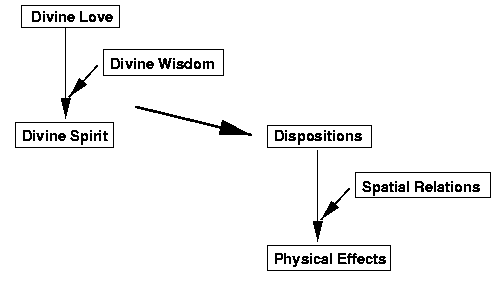 Here I have tried to represent the corresponding facts that
If we reflect on the causes which lead us to think and act as we do,
we see that some love or other is at the very root of these causes and
motivations. So much so that we could agree with Swedenborg when he says
Because our love lends to many different affections and actions in different circumstances, it is not a simple thing. We may never know all its details, but we can understand how our own love operates. Indeed, it is our responsibility to learn how own loves operate, if we are to lead useful or even sensible lives! Now, any love can only act properly if it knows its own circumstances accurately, and can understand the consequences of its own actions. We can summarize this by saying (again!) that 'our loves operate by means of knowledge, to produce our actions'. Our personal loves are again essentially derived from the Divine Love,
in accordance with our personal character that has been built up as we
have actually acted in the past. It may seem surprising to us, but
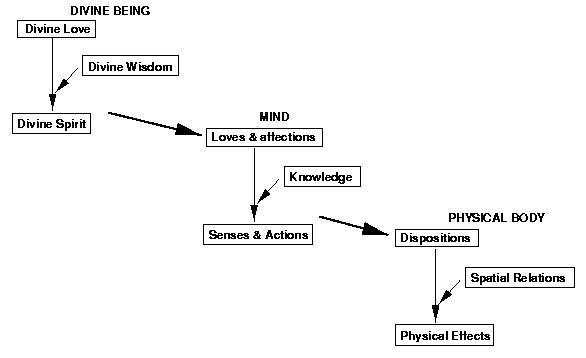 Here I have tried to represent the corresponding facts that
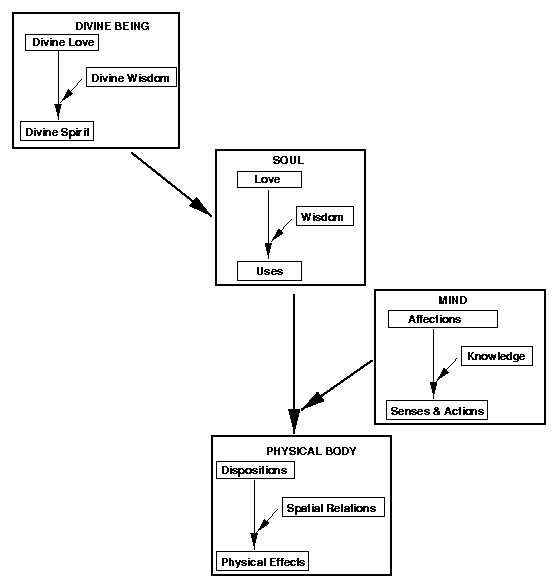 Here I have tried to represent the corresponding facts that
Don't ever imagine that the Divine is simple: it may be a perfect whole, but it is not a featureless and simplistic unity! In fact the Divine is Infinite: if this is not to be a mere honorific term, the Divine must contain infinite things within Itself! Thus there are everywhere in creation representations of the essential Divine character, because created objects are all limitations and derivations of the Divine Life according to all the different actual circumstances that exist in the world. |
|